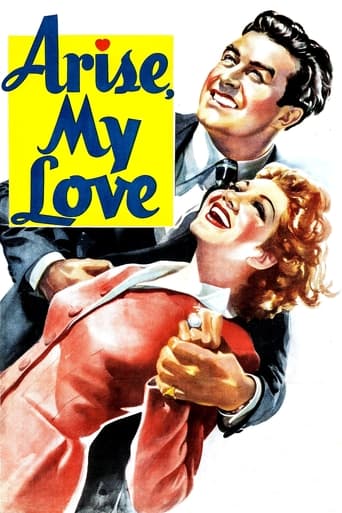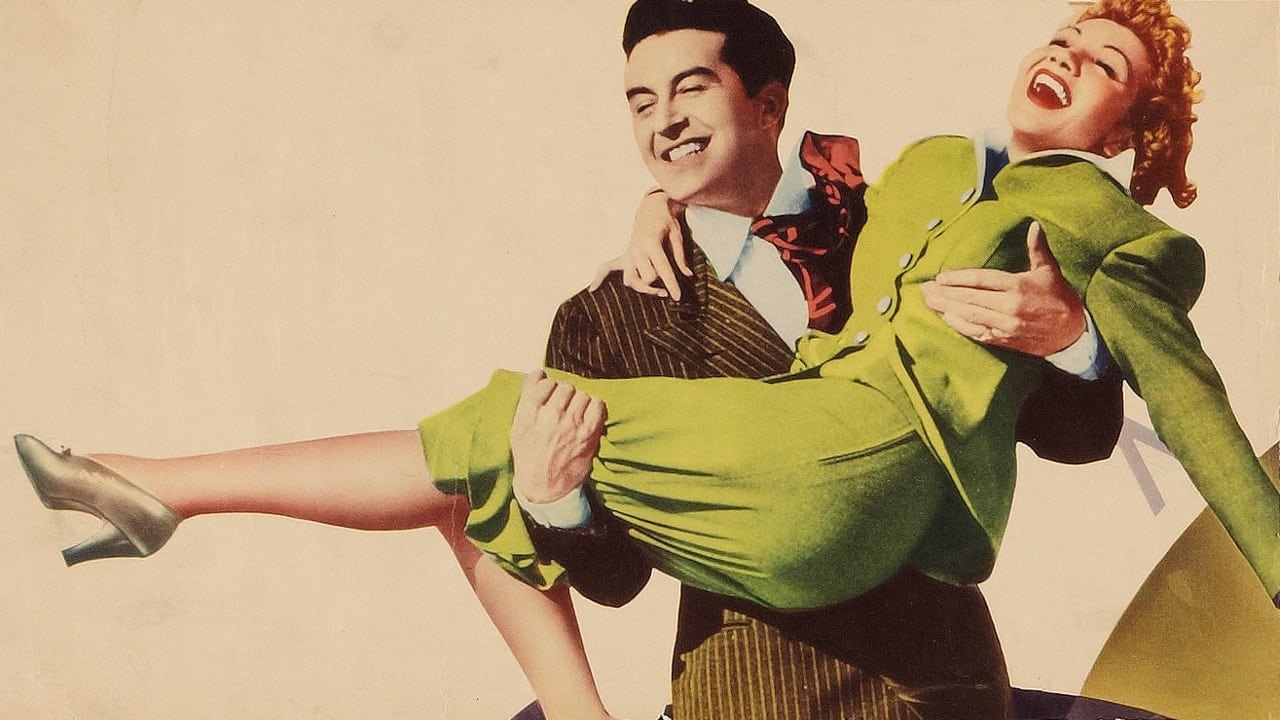writers_reign
This was the fourth out of six Paramount films for which Billy Wilder received a screenplay credit (he actually worked without credit on as many again) and the third of the six (after Bluebeard's Eighth Wife and Midnight) to star Claudette Colbert but whilst the first two were out- and-out comedies Arise, My Love is a fine blend of drama and romantic comedy set against the outbreak of World War 11 and shot just as Paris fell to the Germans in 1940. Another difference between the first two films is that in both Colbert had sterling support from the likes of David Niven, Edward Everett Horton, John Barrymore, Mary Astor whilst here, she and co-star Ray Milland carry the bulk of the plot with Walter Abel sharing a handful of scenes. Although Wilder was unhappy with Mitchell Liesens' directing - he helmed several Wilder screenplays - and claimed that Liesen was the reason he fought to direct his own screenplays the fact is that Leisen makes a fairly decent fist of a fine screenplay and coaxes excellent performances out of the two stars.
MartinHafer
Up until 1939 when Warner Brothers took Nazi Germany in "Confessions of a Nazi Spy", Hollywood was very silent about Hitler and the Third Reich. Part of this was because the American public was staunchly neutral towards Germany and the war. In fact, Hitler had been a rather popular guy in America! Another reason films didn't criticize this repressive regime was because Congress had enacted some unconstitutional legislation that prevented Hollywood for taking a stance towards or against any side in the conflict in Europe! However, starting in 1940, the studios finally declared their independence and a wide variety of anti-Nazi films were released--the tide had finally turned though it wouldn't be until almost 1942 that the US finally got pulled into the war. With films like "Storm Warning", "Escape" and "Arise, My Love" were just a few of the 1940 anti-Nazi films.The movie finds Ray Milland in a Spanish prison awaiting execution after his capture by Franco's Nationalist troops. If you don't remember your history classes, these Nationalists were allies with the Germans and they provided assistance during this civil war--as they wanted to try out all their cool new weapons on the Republican soldiers. As Milland is awaiting death, he laments that he wishes he could live long enough to fight the Nazis directly--a distinctly anti-neutrality statement! However, just before he is shot, his wife shows up and is granted a pardon if he just agrees to leave the country. However, Milland is NOT married and Colbert is actually a crazy reporter who is trying to do a good thing AND get a great story! When this is discovered, the two beat a hasty retreat across the border to France.Soon, the couple are hanging out in Paris. Milland is now a bit of a celebrity and Colbert decides to stick by him to get a story--though the story seems over and you wonder what Colbert really wants. Not surprisingly, the two soon fall in love. But, oddly, Colbert fights hard NOT to fall for Milland and only when she shares a train car on the way to a new assignment in Berlin does she finally give in to Milland's advances. Instead of continuing the journey, they take a brief vacation together--during which WWII begins when the Germans invade Poland. Now the couple are unsure what to do next. Should they go back to America and settle down to a life or domesticity or should they stay and do their part to battle the Fascists? When they chose the safer life in America, things don't go as they'd expect as the ship is sunk by a Nazi sub. This ship, the SS Athenia, was actually the first British ship sank in the war. They survive but what's next?! Try seeing the movie yourself to find out what the two lovers decide to do now.This film is among the most romantic films Milland or Colbert made in their very distinguished careers. But, it is unusual in that it also has such a highly serious side to it as well--and you know the romance is fated as well--providing a wistful tone of the film. It comes off very well and the dialog sparkles...and it has a timely political message as well. Extremely well done and enjoyable.
perfectpawn
Claudette Colbert stated that Ernst Lubitsch was "by far" her favorite director, but this film, directed by Mitchell Leisen, she stated to be her favorite movie. Released in 1940, it marked her fourth collaboration with Leisen (he'd co-directed without credit sequences of the 1932 Cecil B. DeMille production "Sign of the Cross," the movie which made Claudette a star), the man who directed her in more films than any other director.One can see why Claudette liked this film the best: it gave her a meatier role than the parts she'd played over the preceding several years. Ever since 1934's "It Happened One Night" Claudette had mostly done comedy films. This isn't a complaint – the lady had better comedic timing than just about any other actress in Hollywood. But here in Arise My Love she was able to cover the gamut of her talent, from comedy to drama, something she hadn't gotten to do since the Pre-Code years (check out her 1933 "Torch Singer" for an example). Indeed it's this mixture of genres which seems to offset the critics of today. For Arise My Love answers the unasked question: "What if Casablanca had been done as a screwball comedy?" Produced so in-the-moment that the script was rewritten daily to encompass the latest events, Arise My Love was released in 1940 and covers the hectic events of one year, starting in the summer of 1939. Claudette is Gusto Nash, a no-nonsense newspaper reporter who dreams of scoring big headlines. She frees Tom Martin (Ray Milland), a Nazi-hating pilot who's imprisoned on death row in Spain, part of the Liberty battalion of US soldiers who helped that country fight the encroaching Nazis (and lost). The first thirty minutes of this movie are 100% action, with escape via land and air. After this the film moves into screwball territory, with Tom hot for Gusto and Gusto trying to reign in her feelings; she wants to focus on her career. After this we move into drama; together at last, Gusto and Tom are soon separated, Gusto to cover the Nazi menace in various points of Europe, Tom battling the Germans in the Polish air force.Everything hangs together despite the mixing of genres. If I had any complaints it would be that the film ends a bit too weakly, Claudette delivering a passionate soliloquy to a silent Milland. Doubtless this gung-ho speech was intended to stir patriotic fervor in the audience of the day, but now, decades after WWII, it seems a bit anticlimactic. Indeed, the opening thirty minutes of the film are more climatic than the ending. But there are a lot of enjoyable moments. Claudette and Milland have good chemistry and both get a chance to display comedic and dramatic skills.The Sturges/Brackett script is up to the level of their previous Claudette productions ("Bluebeard's Eighth Wife" and "Midnight"), though, again, they don't get as much chance here to unleash their trademark comedy. Leisen's direction is good, too, as is the cinematography and production values. Claudette and Milland traipse about Europe in a variety of locales, from Paris to countryside inns deep in France; all of it done on a set, all of it featuring that Classic Film glamor.Released well after the enforcement of the puritanical Code, Arise My Love still gets in a few surprises – first, there's a delightful scene where Gusto comes up to Tom's room to snap his photo for her article. Tom however thinks she's coming up for sex. This develops into a scene filled with hilarious misunderstanding, with Gusto arranging the setup and Tom becoming increasingly bewildered: "So where shall we do it? How about the chair?" "What?" "Right – too conventional." All of it like "Three's Company," but still very funny. Also, shortly after this scene Gusto and Tom talk in a restaurant; Tom's pretending he's waiting for a (nonexistent) Swedish girl, but really he just wants to be with Gusto (who thinks she's just getting material for her article). There's a moment where Tom asks Gusto to pick out some flowers – flowers he pretends to be buying for the Swedish girl but are really for her. As Tom purchases the flowers she picked out, Gusto looks at him with a dawning understanding that turns into a look of longing – and then, very abruptly, she puts her pen in her mouth. Dr. Freud calling!Despite Claudette's preference for this film, it's never been officially released – not even on VHS. You'll need to scour the sordid world of online DVDR trading/sales to find yourself a copy, one which most likely will have been sourced from a cable TV broadcast.
SaraX626
Definitely in my all time top 10. The Milland/Colbert pairing is fantastic, there is wonderful chemistry between the two stars but it is Colbert who as the independent career woman Augusta Nash launched me on my love of 1930's/1940's films and I would recommend this as a fabulous example of what films of that era have to offer a modern audience. The opening sequences set the adventurous and romantic tone of the movie. The scenes in Maxim's and the in the horse drawn carriage on Monmartre are wonderfully romantic as Tom (Milland) plots to overcome Augusta's business only attitude. A fabulous film which gets home the patriotic message needed as WWII commenced without ever overwhelming the wonderful adventurous story.


 AD
AD



